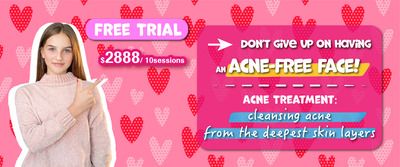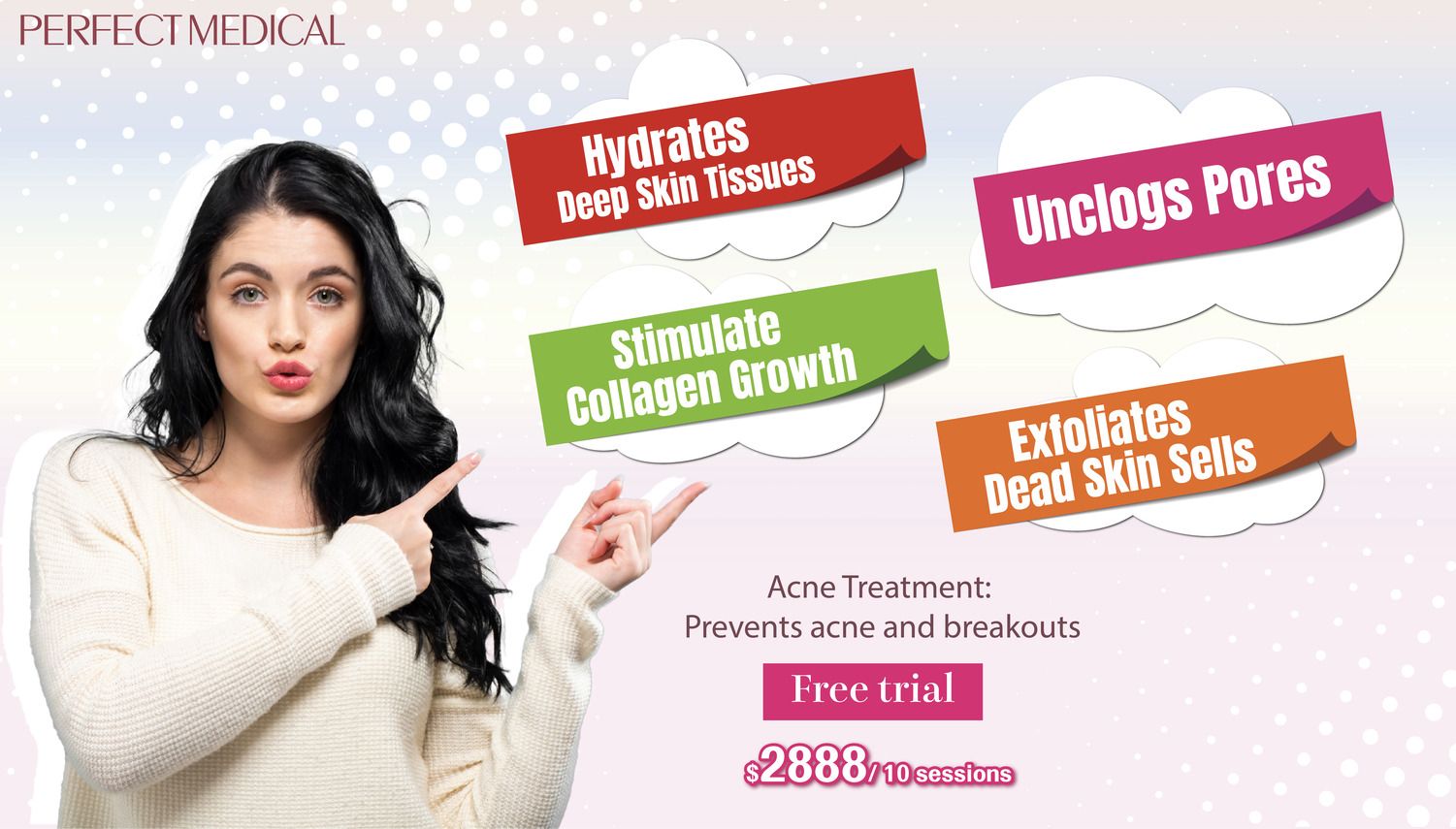
免費體驗
Acne Treatment
1 Minute Self-Registration
Date should not be before minimal date
Acne is a common skin condition that is often associated with adolescence, but it can also affect adults. Adult acne, while similar in some ways to adolescent acne, has its unique causes and challenges. In this comprehensive guide, we will explore the various aspects of adult acne, including its causes, treatment options, and preventive measures.
1
What Exactly Is It?
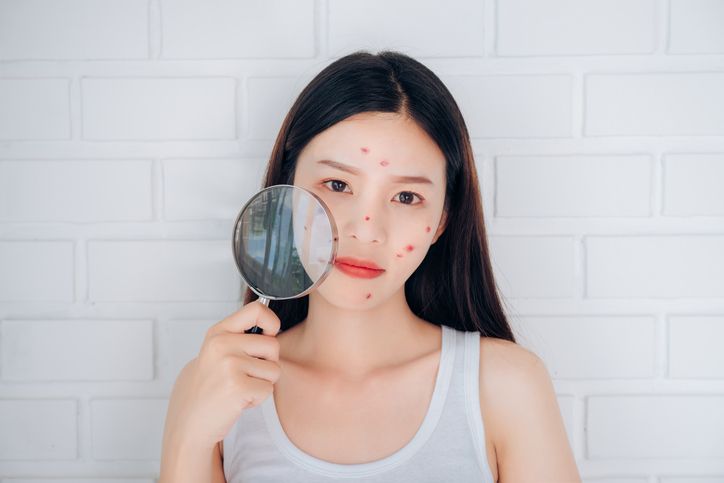
Adult acne is a term used to describe the presence of acne, which are skin blemishes and eruptions, in individuals who have passed their teenage years and have entered adulthood, typically in their 20s, 30s, and even into their 40s. Unlike the common perception that acne is primarily a concern for teenagers, it is not unusual for adults to experience these skin issues as well.
These acne breakouts in adults can take various forms, including pimples, which are red, raised bumps on the skin that often contain pus; blackheads, which are small dark spots on the skin resulting from clogged pores; whiteheads, which are similar to blackheads but appear as small, white or flesh-coloured bumps; and sometimes, more severe forms of acne lesions, such as cysts and nodules. These breakouts can be not only physically uncomfortable but also emotionally distressing, affecting one's self-esteem and overall well-being.

2
The Causes of Adult Acne

1. Hormonal fluctuations
Sometimes, your body's hormones, which are like tiny messengers, get a little mixed up. This can happen especially to women during different life stages like periods, pregnancy, and menopause. When hormones go haywire, they can make your skin break out with acne. Adult acne can be due to hormonal acne, but hormonal acne does not necessarily happen to an adult. There is a specific section that talks about hormonal acne below.
2. Stress
If you're feeling stressed all the time, it can cause your body to produce certain hormones called androgens. These hormones can make your skin's oil factories work overtime, leading to more acne.
3. Skincare products
Some skincare products, especially heavy or pore-clogging ones, can block your skin's tiny openings and create pimples. It's important to pick products that won't do this; they're usually labelled as "non-comedogenic."
4. Diet
What you eat can also affect your skin. If you munch on a lot of sugary and processed foods, it might make your adult acne worse.
- 10 Must-Know Safety Tips on Using Salicylic Acid for Oily Skin and Acne
- Acne Treatments: Benefits and Side Effects!
- All Kinds of Acne Supplements In The World, Which One Is Right For You?
- How to Get Rid of Blackheads Safely: 11 Skin Care Products and Home Remedies You Should Have Tried Already, According to Dermatologists
3
I'm Confused: What's the Difference between Adult Acne and Hormonal Acne?

Adult acne and hormone acne are related but not necessarily the same. Here's the distinction:
Adult Acne
- Adult acne is a broad term used to describe acne that occurs in adults, typically after the age of 25. - It can encompass various types of acne, including whiteheads, blackheads, pustules, and cysts. - The causes of adult acne can be multifactorial and may include hormonal fluctuations, genetics, lifestyle factors, and skincare habits. - Adult acne can occur in both men and women and is not limited to any specific age group. - It can be influenced by factors like stress, diet, and the use of certain skincare products.
Hormonal Acne
- Hormonal acne, on the other hand, is a specific type of acne that is primarily driven by hormonal fluctuations in the body. - It is often characterised by deep, painful cystic acne lesions that tend to appear on the lower face, jawline, and neck. - Hormonal acne is more common in women, particularly during certain life stages such as puberty, the menstrual cycle, pregnancy, and perimenopause. - It is strongly influenced by hormonal imbalances, especially elevated levels of androgens (male hormones) like testosterone. - Treatment for hormonal acne often involves hormonal therapies like birth control pills or anti-androgen medications, in addition to topical and oral acne treatments.
While adult acne can encompass various forms of acne that occur in adults, hormonal acne is a specific subset of adult acne driven primarily by hormonal imbalances. It's essential to understand the specific causes and triggers of your acne to determine the most effective treatment approach, as treatments for hormonal acne may differ from those for other types of adult acne.

4
What Kind of Food Can Worsen Acne?

Certain foods can potentially trigger or worsen adult acne in some individuals. While the impact of diet on acne can vary from person to person, here are some common food categories that may contribute to acne breakouts:
1. High glycemic index (GI) foods
Foods with a high glycemic index, such as sugary snacks, white bread, and sugary cereals, can cause rapid spikes in blood sugar levels. These spikes may lead to increased insulin production, which can stimulate oil production and contribute to acne.
2. Dairy products
Dairy, particularly skim milk, has been associated with an increased risk of acne in some studies. It is thought that hormones and growth factors in dairy products may influence skin oil production and inflammation.
3. Foods high in saturated and trans fats
A diet rich in saturated and trans fats, often found in fast food, fried items, and some processed snacks, may promote inflammation in the body, which can worsen acne.
4. Chocolate
While the link between chocolate and acne is not fully established, some individuals may find that consuming large amounts of chocolate, especially those with high sugar and dairy content, can lead to breakouts.
5. Processed and fast foods
Highly processed foods, including fast food items like burgers, fries, and sugary beverages, often contain high levels of sugar, unhealthy fats, and artificial additives that may contribute to acne development.
6. Iodized salt
Excessive iodine intake from iodized salt or foods high in iodine, like seafood and some processed foods, may lead to acne breakouts in sensitive individuals.
7. Spicy foods
Spicy foods can dilate blood vessels and increase blood flow to the skin, potentially leading to increased redness and inflammation in acne-prone skin.
8. High-fructose corn syrup
Foods and beverages sweetened with high-fructose corn syrup may contribute to acne due to their high sugar content and potential impact on insulin levels.
It's important to note that the relationship between diet and acne is complex, and not everyone will experience acne flare-ups due to dietary factors. Genetics, hormones, and individual sensitivities also play significant roles in the development of acne. If you suspect that certain foods are worsening your acne, consider keeping a food diary to track potential triggers and consult with a dermatologist or healthcare provider for personalised advice on managing your skin condition.
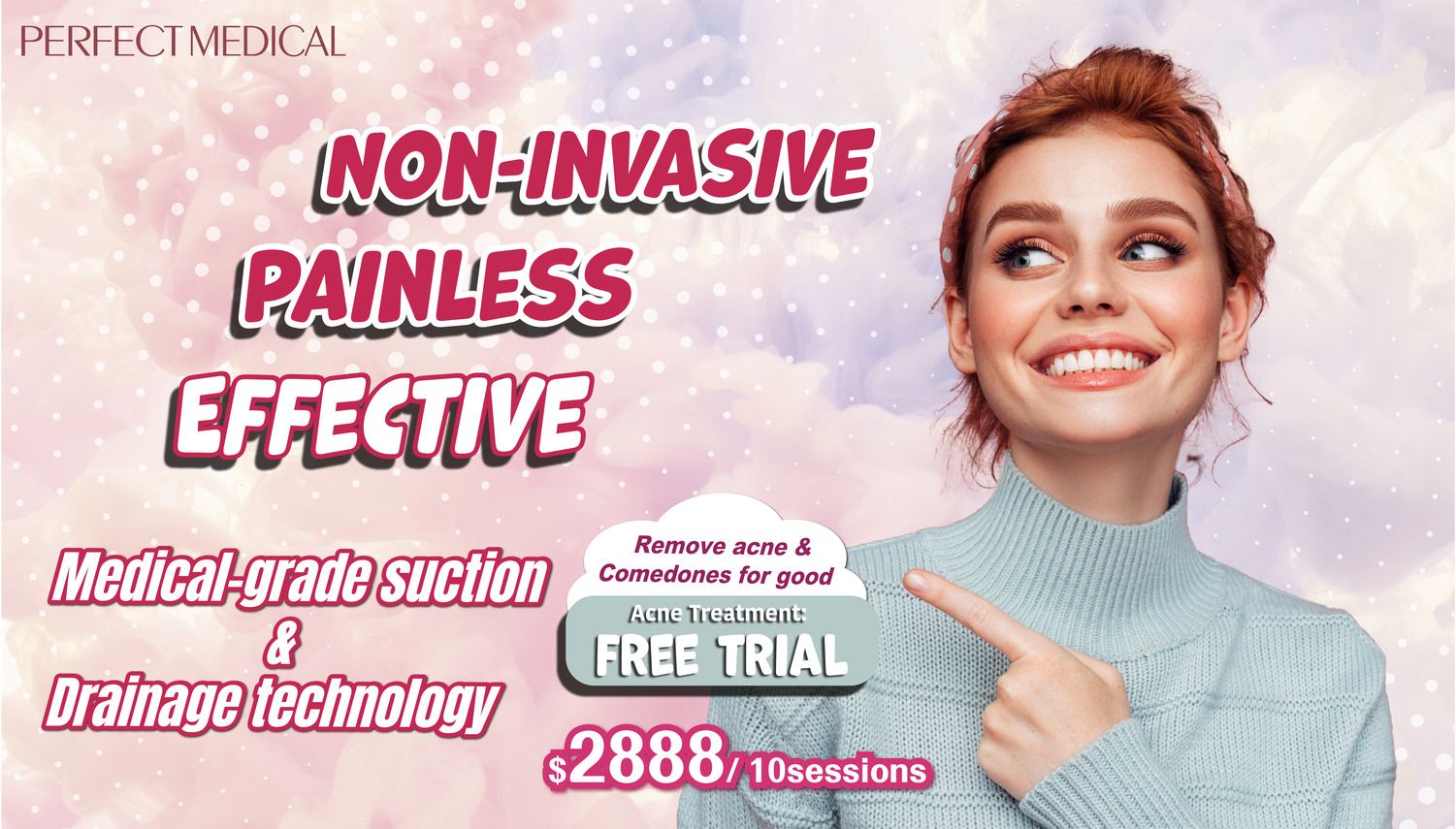
免費體驗
Acne Treatment
1 Minute Self-Registration
Date should not be before minimal date
5
How Can I Treat Adult-Onset Acne with Medical Help?

Topical treatments
There are creams and gels you can buy without a prescription that have special ingredients like benzoyl peroxide, salicylic acid, or retinoids. These can be put directly on your skin to help get rid of acne.
Oral medications
In more serious cases of adult acne, doctors might give you pills to take. These can include antibiotics (which fight bad bacteria), hormonal therapy (to balance hormones), or isotretinoin (a powerful acne medicine).
Professional Treatments
Sometimes, going to a skin doctor (dermatologist) is the best way to deal with adult acne. They can do treatments like chemical peels (using special liquids to peel away bad skin), microdermabrasion (exfoliating your skin), or laser therapy (using beams of light to treat acne).
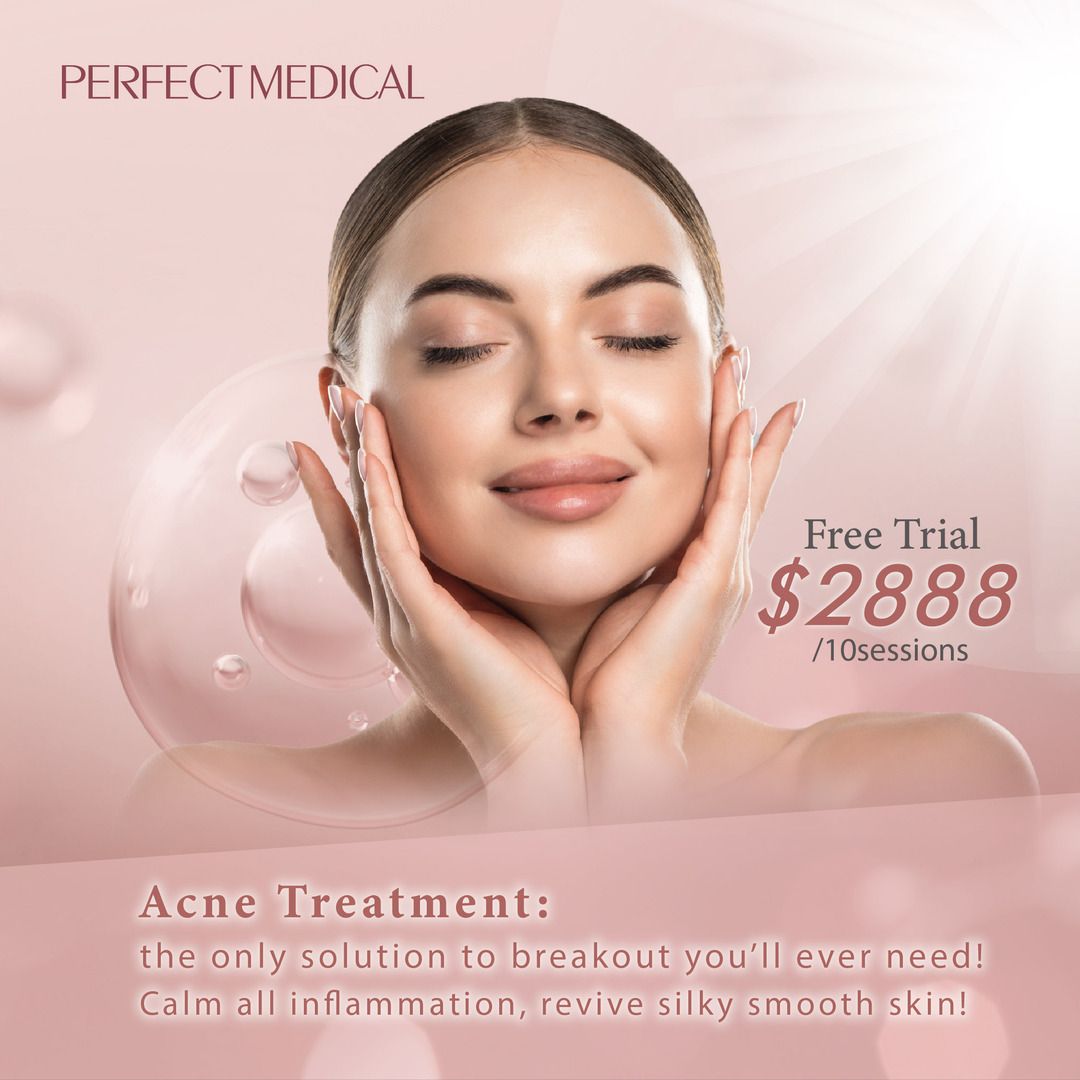
6
Farewell to Severe Acne with Perfect Medical!

Individuals with acne-prone skin can greatly benefit from Perfect Medical's Acne Treatment. This specialised procedure employs vacuum microdermabrasion to effectively address several key skin concerns. Firstly, it unclogs pores, reducing the likelihood of acne formation. Additionally, it minimises skin irritation and expedites the skin's natural process of shedding dead cells.
During the treatment, a unique dual spiral suction, combined with a drainage process, is employed. This combination serves to open up your pores while mitigating the inflammatory and contagious aspects of acne by eliminating dead skin cells. Subsequently, a hydrating serum is carefully infused into the skin. This serum not only encourages collagen production but also regulates sebum (oil) levels. This reduction in excess oil production is crucial in preventing future acne breakouts.
Consequently, this acne treatment proves highly effective in addressing a broad spectrum of skin issues, including active acne, blemishes, blackheads, whiteheads, pockmarks, enlarged pores, dry skin, and the appearance of acne scars. By deeply moisturising the skin, stimulating collagen synthesis, and controlling sebum production, this therapy significantly reduces the occurrence of acne and blackheads. It is effective for adult female acne and those women who have active oil glands. Come book a trial and try the goodness today!
Remember, everyone's skin is different, so what works for one person might not work for another. It's essential to be patient and consistent with your chosen treatment, and it's often a good idea to consult a dermatologist for personalised advice if your adult acne is severe or persistent.
- Getting Rid of Acne Scars 101: A Guide for Sensitive Skin
- Back Acne: Why Are They So Irritating? Find Out What You Can Do To Get Rid Of Them
- How Does Pimple Patch Improve Acne and Breakout? What Are the 10 Best Pimple Patches?
- Annoyed By Frequent Breakouts? Check Out How To Fight Acne On Chin With Ease!
7
Preventive Measures: Strengthen Your Skin Barrier

Proper skincare routine
If you want to completely say goodbye to adult acne, you shall have a check on your routine and skin care products. Establishing a daily skincare routine is fundamental in maintaining clear and healthy skin. Start with gentle cleansing to remove dirt and excess oil from your face. Use a mild, non-comedogenic cleanser to prevent clogged pores. Follow up with moisturising, even if you have oily skin. A good moisturiser helps maintain your skin's natural barrier and prevents overproduction of oil.
Stress management
Stress can exacerbate acne by triggering hormonal changes in the body. Implement stress reduction techniques into your daily life, such as meditation, yoga, or deep breathing exercises. These practices can help lower stress levels, reducing the likelihood of stress-induced acne breakouts.
Diet and hydration
A balanced diet plays a significant role in skin health. Incorporate a variety of fruits, vegetables, and whole grains into your meals. These foods are rich in vitamins and antioxidants that promote skin health. Additionally, ensure you stay hydrated by drinking plenty of water. Proper hydration helps maintain skin elasticity and can prevent excessive dryness or oiliness.
Avoiding trigger foods
Identifying trigger foods that may worsen your acne is crucial. Keep a food diary to track your diet and note any correlations between specific foods and acne flare-ups. Trigger foods can vary from person to person and may include items like dairy, sugary foods, or processed snacks. By avoiding these triggers, you can potentially reduce the frequency and severity of breakouts.
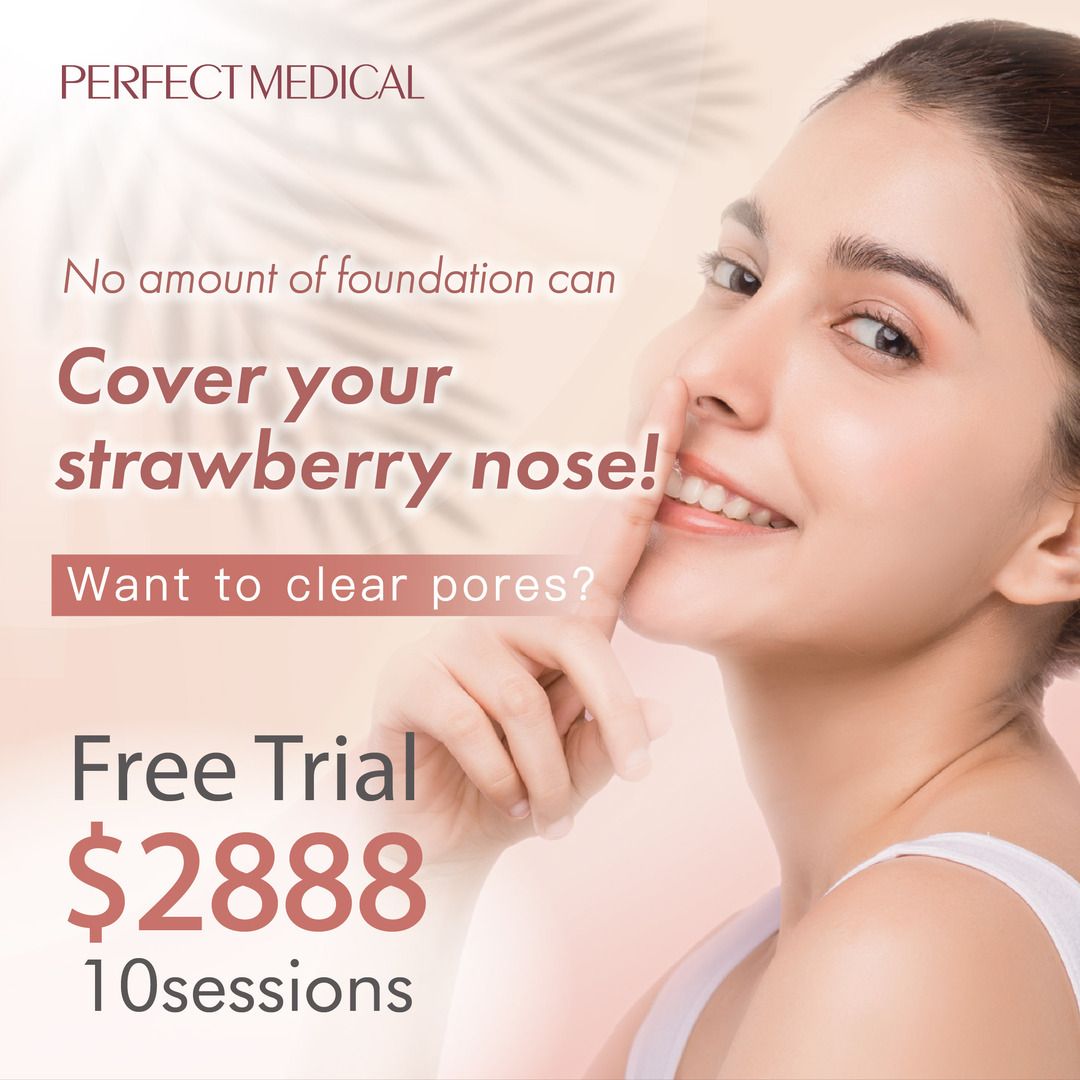
8
Dealing with Adult Acne Psychologically

Some people may feel that having adult acne is a pain, both physically and emotionally, as it can not only manifest as skin discomfort but also lead to a range of psychological challenges, impacting self-esteem and overall well-being. Here's what you can do in daily life:
Seek support
Dealing with adult acne can take a toll on your self-esteem and emotional well-being. It's essential not to face this challenge alone. Reach out to friends and family for emotional support. If acne is significantly affecting your mental health, consider seeking assistance from a mental health professional. They can provide coping strategies and support to help you navigate the emotional aspects of acne.
Camouflage techniques
While you work on improving your skin's health, you can use makeup techniques to conceal acne and boost your confidence. Invest in high-quality, non-comedogenic makeup products that won't clog your pores. Learn how to apply foundation and concealer effectively to cover blemishes without aggravating them. Makeup can serve as a temporary solution to mask acne while your skin heals, but make sure you do a proper skin care afterwards else it might clog pores, causing more issue to your existing acne treatment regimen.
Remember, managing adult acne is a holistic approach that combines skincare, lifestyle changes, and psychological support. By following these preventive measures and seeking support when needed, you can effectively address and manage adult acne.

免費體驗
Acne Treatment
1 Minute Self-Registration
Date should not be before minimal date
9
Conclusion

Adult acne can be a frustrating and challenging condition to manage, but it is treatable and preventable. By understanding the causes, exploring effective treatment options, and adopting a healthy lifestyle, you can regain control over your skin and enjoy clearer, blemish-free days!
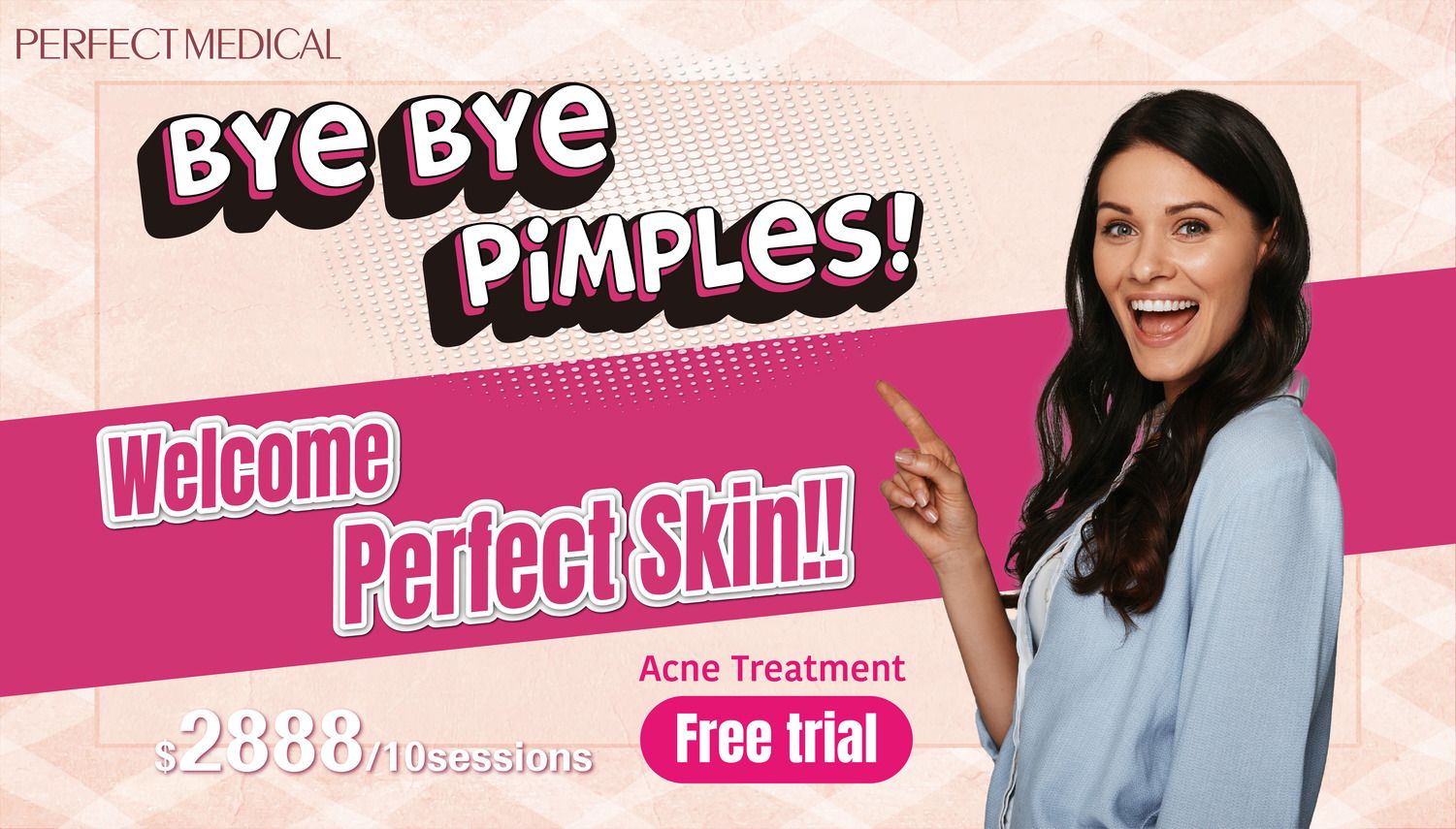
免費體驗
Acne Treatment
1 Minute Self-Registration
Date should not be before minimal date
FAQ

1. Can hormonal birth control help with adult acne?
Hormonal birth control, such as birth control pills, patches, or hormonal intrauterine devices (IUDs), can be prescribed by a healthcare provider to help regulate hormones and improve acne in some cases. These contraceptives contain hormones that can reduce the production of androgens, which are hormones associated with increased oil production and acne. However, the effectiveness of hormonal birth control for acne can vary from person to person. It may take several weeks to months to see noticeable improvements in acne after starting hormonal birth control.
2. Are there natural remedies for adult acne?
Natural remedies like tea tree oil and aloe vera have been found to have some effectiveness in treating acne. Tea tree oil has antibacterial properties that can help reduce acne-causing bacteria, while aloe vera has soothing and anti-inflammatory properties that can alleviate skin irritation. However, the effectiveness of these remedies can vary from person to person, and they may not work for everyone. It's important to use them cautiously and consult with a dermatologist before incorporating them into your skincare routine.
3. How long does it take to see results from acne treatments for sensitive skin?
The timeline for seeing results from acne treatments for sensitive skin can vary based on several factors, including the severity of the acne and the chosen treatment. In general, it may take several weeks to a few months to notice significant improvements. It's important to be patient and consistent with your skincare routine, and it's advisable to consult with a dermatologist who can provide personalised guidance and monitor your progress.
4. Can adult acne be a sign of an underlying health issue?
Yes, in some cases, adult acne can be a sign of an underlying hormonal or medical condition. Hormonal imbalances, polycystic ovary syndrome (PCOS), and other health issues can contribute to adult acne. If you suspect that your acne may be related to an underlying health problem, it's essential to consult a healthcare provider or dermatologist for a thorough evaluation and appropriate diagnosis. Treating the underlying condition may also help improve acne.
5. Is it possible for adult acne to recur after successful treatment?
Yes, it is possible for adult acne to recur, even after successful treatment. Acne can be influenced by various factors, including hormones, genetics, lifestyle, and stress. If the underlying causes of acne are not addressed or if there are triggers that lead to acne flare-ups, it can return. Maintenance and ongoing skincare routines, as well as addressing any contributing factors, are important in preventing acne from recurring after successful treatment.
